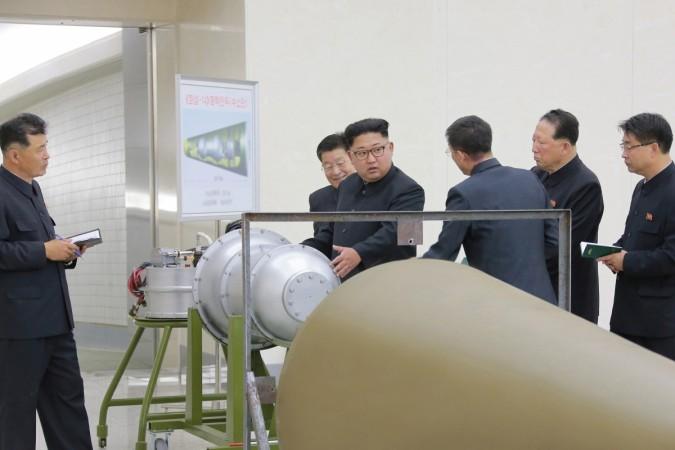India and China, fresh off the two-month-long Doklam standoff, may have a new problem on their hands. And this one— the task of addressing North Korea and its nuclear problem— could be the rare one that brings together the two countries that have not exactly been traditional friends.
The Doklam standoff and allied topics were expected to be discussed by India and China when the premiers of the countries would meet in Xiamen in China for the 9th BRICS Summit along with their counterparts from Brazil, Russia and South Africa.
However, with North Korea not just announcing but testing what it said was a Hydrogen bomb, Narendra Modi and Xi Jinping will have a new task on their hands: Devise a way to dissuade North Korea from using whatever deadly munition it has developed.
US President Donald Trump has already warned North Korea's third-generation dictatorial leader Kim Jong-un of "fire and fury" if the latter chooses to attack US territory -- more specifically, Guam.
If either the US or North Korea launch a nuclear weapon, the result could be calamitous, to say the least. Studies have shown that even a "limited nuclear war" — a euphemism for small-scale use of nuclear weapons — could lead to something called Nuclear Autumn, and result in the death of one out of seven people on Earth!
![[Representational image] Nuclear eplosion](https://data1.ibtimes.co.in/en/full/657984/nuclear-eplosion.jpg?h=450&l=50&t=40)
'Game changer' bomb
The danger is all the more tangible now because of the test conducted by North Korea on Sunday, September 3— its sixth nuclear test ever — indicated that it had either already developed or was close to developing a two-stage hydrogen bomb.
The test had led to tremors whose magnitude was recorded at 6.3 on the Richter scale, meaning it was 10 times more powerful than the bomb it had last tasted. At 120 kilotons, it was six-to-eight times more powerful than Little Boy or Fat Man — the two atom bombs the US had dropped on Hiroshima and Nagasaki at the fag end of World War II.
Kune Y Suh, a nuclear engineering professor at Seoul National University, was quoted by Reuters as saying: "North Korea has effectively established itself as a nuclear state. This is not just a game changer, it's a game over."
It is this "game over" that needs to be stopped, and India and China may have to team up for it.

Why India and China?
Of course, there are other countries that might look to step in and try to broker peace between North Korea and any other country it perceives as a foe. That possibility is remote at best, because there are few countries with which North Korea will choose to deal with.
China, on the other hand, has had years of business with North Korea, and is one of its lead trade partners. Beijing could look to use that influence to get Kim Jong-un to stop dealing in threats of nuclear war.
India may not have a similar influence, despite surprisingly being the second-largest trade partner of North Korea. But that and India's diplomatic prowess should be enough to bring Kim around, according to a top US commander.
US Pacific Command chief Admiral Harry Harris had said in August regarding nuclear threats issued by Kim and his regime: "I think India's voice is a loud voice, that people pay attention to. So, I think that India could help North Korea, perhaps, understand the seriousness by which the United States views that threat."
Trump, too, believes in India when it comes to dealing with Pyongyang. He had in late June thanked India "for joining us in applying new sanctions against the North Korean regime."
![In picture: Prime Minister Narendra Modi and Chinese President Xi Jinping. [Representational image] Narendra Modi and Xi Jinping](https://data1.ibtimes.co.in/en/full/660729/narendra-modi-xi-jinping.jpg?w=658&h=448&l=50&t=40)
Pressure vs tact
Thus, when Modi and Jinping meet on the sidelines of the 9th BRICS Summit over the next few days, they will most probably decide to let their best diplomats come up with an idea to dial down US-North Korea tensions.
How these diplomats go about it will be the real challenge. After all, Kim has been known to react to pressure by only escalating tensions. Therefore, threats from China and India— like stopping trade with North Korea— could only hasten a nuclear launch.
On the other hand, dictators rarely heed tact. If Kim turns out to be the exception — basically if he can be made to believe that he has won a victory with any one of his moves — the path of careful tact may be the best way out of this crisis.

















